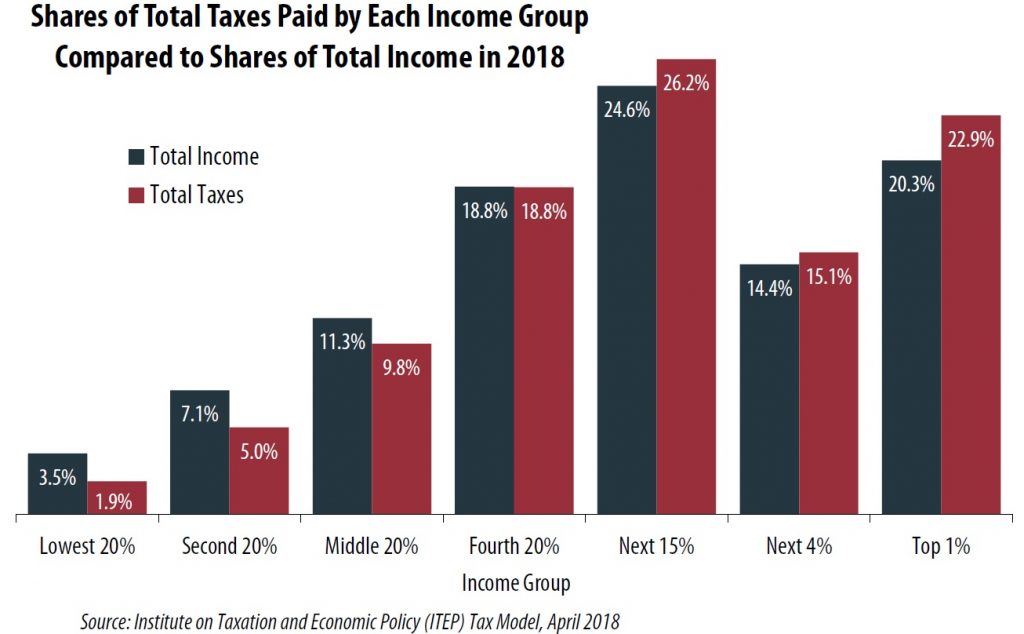Today I published a report describing how a federal wealth tax on the top 0.1 percent of Americans could raise substantial revenue while helping to counter growing inequality. My colleagues at ITEP and I thought long and hard about this because it would be an entirely new type of federal tax and the challenges in implementing it initially seem daunting. But over time it has become clear that those challenges must be overcome because our current tax system, which mostly focuses on taxing income, may not be sufficient to raise adequate revenue or reverse rising inequality.
Wealth inequality is much greater than income inequality. The 1 percent of Americans with the highest incomes receive about a fifth of the total income in the United States. In contrast, the top 1 percent of wealth holders in the United States own 42 percent of the nation’s wealth, according to estimates from University of California at Berkley economists Emmanuel Saez and Gabriel Zucman.
Likewise, the racial wealth gap is far greater than the racial income gap in the nation. According to Census data, median income in 2017 was about $68,000 for white households compared to $50,000 for Latinx households and about $40,000 for black households. The racial wealth gap is far more dramatic because it is a result of generations of compounded inequality. A recent report from Prosperity Now finds that in 2016 median wealth in the U.S. was $140,500 for white households but just $3,400 for black households and $6,300 for Latinx households. The income tax, on its own, is unlikely to entirely address this kind of inequality.
Another problem is that the income tax is not designed to deal with how the rich become richer. In an economic sense, a lot of the income enjoyed by the very rich is “unrealized” gains, the appreciation of assets that have not been sold, which is not touched at all by the income tax.
This seems like an arcane point but it’s worth unpacking. If you define income the way an economist would define it, you would see any increase in a person’s net worth as income.
Let’s say you earn $100,000 from your job this year so you have $100,000 of income in the eyes of the federal income tax. But imagine you also own assets that were worth $500,000 last year and which appreciated so that they are worth $1 million this year.
An economist would say that $500,000 in growth in the value of your assets is income because you have an additional $500,000 to spend or invest or do whatever you want.
But as far as the federal income tax is concerned, asset appreciation is not income unless you sell it. (In other words, your capital gains are not “realized” unless you sell your assets.) Instead of paying taxes on $600,000 in income, you pay taxes only on the $100,000 of income you earned.
This might be a fine outcome in the case of a taxpayer who is not rich. If a middle-income family has an asset (perhaps their home) that appreciates, they do not necessarily have the liquidity to pay additional income taxes on the unrealized capital gains. But what about a household with, say, $30 million in assets? Why should we continue to rely on the federal income tax to make sure the very, very rich pay their fair share, when we know the income tax simply ignores the way they get richer?
One solution is to tax the net worth, in addition to the income, of the very wealthiest households. As described in the report, a 1 percent federal tax could be imposed on a net worth exceeding a set threshold that is adjusted each year to ensure that only the wealthiest 0.1 percent pay it. In 2020, this threshold would likely be $32.2 million. This means, for example, someone with a net worth of $32.4 million would pay 1 percent of $200,000, which comes to $2,000.
Using data from Saez and Zucman, the report explains that such a tax could raise about $1.3 trillion over a decade, without affecting anyone outside the top 0.1 percent of wealth holders.
In some ways, it is unfair not to impose this kind of tax on the very wealthy. For many middle-income families, the main component of their wealth is their home, and that wealth is subject to a tax in the form of a local property tax. But for very wealthy households, homes are typically a small part of their assets. Most of their net worth is, therefore, not subject to any sort of wealth tax. The proposal described in this report would ensure that the wealth of the top 0.1 percent is treated similarly to the wealth of everyone else.
What Are the Obstacles to Implementing a Wealth Tax?
There would certainly be challenges in enforcing a wealth tax. Enforcing the income tax on the very rich is also a complex project, but the IRS still does it.
It is true that the IRS is mostly set up to measure and tax income rather than wealth. It is also true that some assets owned by the wealthy are difficult to value. For example, it is not immediately obvious how to value an ownership stake in a company that is not publicly traded.
But the IRS already deals with this because we do tax the net worth of very wealthy people—once, after their deaths, through the estate tax. While the federal estate tax is currently riddled with loopholes, it is basically a wealth tax, and the IRS is already assessing the net worth of very wealthy people to enforce it. This report explains how the process could be streamlined so that the IRS could do this annually as it implements a 1 percent wealth tax.
Aside from questions about its administration, the most common question raised about a federal wealth tax is whether it is constitutional. To make a long story short, as part of the compromise made by the Framers to bring southern and northern states together, the Constitution has provisions limiting Congress’s power to impose “direct” taxes, to limit the federal taxes that southern taxpayers might have to pay on their slaves and on their land. But even at the time the Constitution was drafted, no one knew what taxes might qualify as “direct.”
Through most of the nation’s history the Supreme Court interpreted the term “direct” very narrowly so that it rarely limited Congress’s power to levy taxes. But a couple of Supreme Court decisions veered sharply away from this tradition of deference to Congress’s taxing powers, most notably the 1895 decision that struck down a federal income tax and lead to ratification of the 16th Amendment to overturn its result.
As the report explains, several legal scholars believe that the reasoning of the 1895 case conflicted with all precedent and has been substantially eroded by subsequent decisions. They point out that the “direct tax” clauses were part of a compromise over slavery and the very different context in which we live today should lead us back to a very narrow interpretation of these provisions.
Time for a New Idea
Economists focused on inequality like Thomas Piketty as well as Saez and Zucman and others have for several years called for a wealth tax as the only real solution. It is time for this concept to move from academia into serious policy discussions. The alternative is to accept a tax system that will never truly ensure that the very rich pay their fair share and that will never really address inequality.





